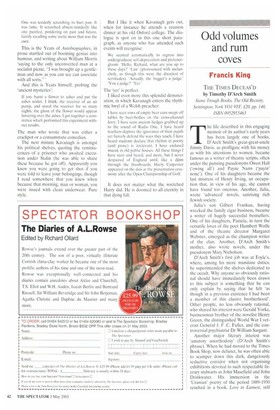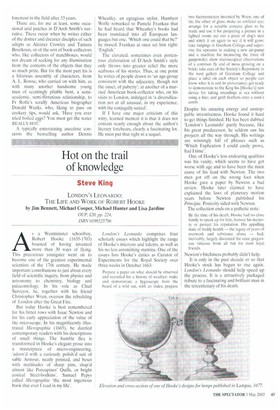Odd volumes and rum coves
Francis King
THE TIMES DECEAS'D by Timothy D'Arch Smith Stone Trough Books, The Old Rectory, Settrington, York YO1 9TF, .E20, pp. 140, ISBN 0952953463 The life described in this engaging memoir of its author's early years has been largely one of books. D'Arch Smith's great-great-uncle Jimmy Davis, as profligate with his money as with his attentions to women, became famous as a writer of theatre scripts, often under the punning pseudonyms Owen Hall (owing all') and Payne Nunn ('payin' none'). One of his daughters became the last mistress of Henry Irving, an occupation that, in view of his age, she cannot have found too onerous. Another, Julia, wrote 'advanced' novels, satirising rich Jewish society.
Julia's son Gilbert Frankau, having wrecked the family cigar business, became a writer of hugely successful bestsellers. One of his daughters, Pamela, in turn the versatile lover of the poet Humbert Wolfe and of the theatre director Margaret Webster, emerged as the champion writer of the clan. Another, D'Arch Smith's mother, also wrote novels, under the pseudonym Mary Nicholson.
D'Arch Smith's first job was at Foyle's, where, among his more mundane duties, he superintended the shelves dedicated to the occult. Why anyone so obviously rational should have immediately been drawn to this subject is something that he can only explain by saying that he felt 'as though in a previous existence I had been a member of this elusive brotherhood'. Other people, no less obviously rational, who shared his interest were Gerald Yorke, businessman brother of the novelist Henry Green, the distinguished World War I veteran General J. F .C. Fuller, and the controversial psychiatrist Dr William Sargant.
Another major literary interest was 'amatory unorthodoxy' (D'Arch Smith's phrase). When he had moved to the Times Book Shop, now defunct, he was often able to scamper down this dark, dangerously seductive corridor when not organising exhibitions devoted to such respectable literary stalwarts as John Masefield and John Drinkwater. His immersion in the `1Jrantan' poetry of the period 1889-1930 resulted in a book, Love in Earnest, still
foremost in the field after 33 years.
There are, for me at least, some occasional arid patches in D'Arch Smith's narrative. These occur when he writes either of the dottier and drearier disciples of such adepts as Ale ister Crowley and Tamara Bourkoun, or of the sort of book-collectors who, like collectors of matchboxes, would not dream of seeking for any illumination from the contents of the objects that they so much prize. But for the most part his is a hilarious assembly of characters, from A. L. Rowse, who carried on with him, as with many another handsome young man of seemingly pliable bent, a semiacademic, semi-flirtatious relationship, to Fr Rolfe's scruffy American biographer Donald Weeks, who, liking to pass on cookery tips, would ask, Have you ever tried boiled eggs? You must get the water REALLY HOT.'
A typically entertaining anecdote concerns the bestselling author Dennis
Wheatley, an egregious stylist. Humbert Wolfe remarked to Pamela Frankau that he had heard that Wheatley's books had been translated into all European languages but one. 'Which one could that be?' he mused. Frankau at once set him right: 'English.'
The elevated, sometimes even portentous elaboration of D'Arch Smith's style only throws into greater relief the more scabrous of his stories. Thus, at one point he writes of people drawn to 'an age-group consistent with the adjacency, though not the onset, of puberty': at another of a married American book-collector who, on his visits to London, indulged in 'a diversification not at all unusual, in my experience, with the conjugally suited'.
If I have one major criticism of this witty, learned memoir it is that it does not contain nearly enough about the author's literary forebears, clearly a fascinating lot. He must put that right in a sequel.











































































 Previous page
Previous page